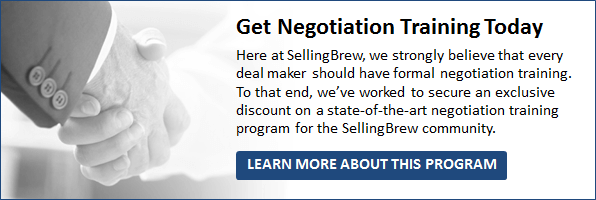Since we first started talking about the costly mismatch that exists between buyers and sellers in the area of negotiation skills and training, we’ve had a number of questions through the Help Desk about how best to go about fixing it.
It’s one thing for you to become aware of a deficiency in systemic capabilities that is likely costing your company 3-5% right off the top. But it’s another thing altogether to get others in your organization to acknowledge the deficiency and actually agree to the necessary remedies.
After all, the deficiency exists for a reason, right? And it’s probably been there for a very long time. So, it’s now entrenched…part of the status quo…cocooned in many layers of ignorance, rationalization, and maybe even outright denial.
To help our subscribers tackle this critical issue, we’ve recently published an in-depth review of a negotiation training program that members of our team have actually gone through. We’ve also conducted an Expert Interview with Jason Levinson, a negotiation instructor with many years of experience building better negotiators on both sides of the table.
These educational resources contain a variety of helpful suggestions and useful tips for moving forward. Here’s a small sampling:
- Help other people recognize the skills gap on their own. From a change management perspective, it’s always better when it’s their idea. To facilitate this, you might refer to our research on the matter and let them draw their own conclusions. You might conduct a little survey to surface the truth about how few of your salespeople have received formal negotiation training at any point in their careers.
- Model the potential gains, but position them as losses. To illustrate the value of solving the problem, use your most recent performance data to quantify what a small reduction in discounting would be worth in terms of revenue and profit. But because there’s always a lot of skepticism around potential “blue sky” gains, you’ll want to consider positioning these values as negotiation losses that can be avoided in the future.
- Aim for a relatively painless “pilot program” as a first step. Short-circuit the tendency to claim that the problem it too big, too risky, or too expensive to address by recommending a pilot program. Identify a small group of Meaty Middle sales reps to run through the training initially. Then, leverage the post-training improvements in their performance…quantitative and qualitative…to support and justify further expansion.
- Focus on the people that can provide a lot of leverage. Another way to get started in a smaller way is to first focus on training only those people whose influence over deals or salespeople is somewhat magnified. For example, just getting Bid Desk personnel trained in negotiations can positively influence a lot of bigger deals…and the salespeople working them. Similarly, getting your sales managers trained can have magnified effect as they positively influence all of their direct reports and the deals they’re working.
- Run members of your own team through the training. It’s always easier to represent something new and different when you’ve already been through it yourself. Going through it yourselves, your team will know a lot more about what you’re recommending—what’s actually involved, the hurdles that need to addressed, how best to position the benefits, etc. Beyond that, just having trained negotiators on your team will no doubt have a positive influence on the sales team through their day-to-day interactions and conversations.
Correcting an entrenched deficiency with the scope and magnitude of something like the “negotiation skills gap” is never easy. And while it might be nice to think you can just make your case to management and secure immediate agreement around both the problem and the ultimate solution, that outcome is pretty rare.
So you have to tackle this with full recognition of the organizational dynamics involved and be prepared to accept a series of smaller wins in the right direction.
( “Nibbling” is a strategy you’ll learn about in negotiation training 🙂 )













